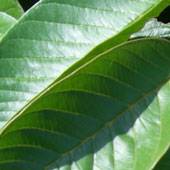| 2015 | APR | |||||||
| 2014 | JUL | OCT | DEC | |||||
| 2013 | JAN | FEB | APR | MAY | JUN | JUL | AUG | SEP |
| 2012 | SEP | OCT | NOV | DEC |
Okinawan Longevity Secrets: Guava
 Known as "banjirou" in Japan. A member of the Myrtle family, the guava plant reaches roughly 3m. In Okinawa, guava is commonly known as "banshiruu". In days past, children would pick the fruit of the plant on their way home from school, soothing their mouths by repeatedly nibbling at and then spitting it out. Accordingly, the plant grows along roadsides, and seems not to have been commonly planted in gardens, which is to say that it was not regarded as having much use. The nostalgia of the Uchinanchu towards "banshiruu" in spite of this is no doubt because of its unique and powerful fragrance. As in the song by folk duo Yachimun, once you have tread upon it, you will always remember its smell. In this way, "banshiruu" has been known by all yet somehow remained in the shadows. Recently, however, it has come into the spotlight. What's making news, though, is not the fruit, but the leaves. Major beverage manufacturers are already marketing the leaves in the form of tea, and recently, guava and persimmon leaves have been mixed to make a similar tea that is already on the shelves of a number of convenience stores in Okinawa as well. Guava's tartness and pungency prompted the joint development by the Okinawa Industrial Technology Center together with local business of "fermented guava", using fermentation technology to both soften the flavor and increase mineral content. It is marketed based on its hyperglycemia-inhibiting action. Experiments by the same center entailing the ingestion of guava by mice also produced data showing a reduction in their blood sugar levels by half. A beneficial effect on insulin was also reportedly observed, showing promise regarding the prevention of diabetes. Similar results have also been obtained using fermented guava. Awareness of such effects has also led to guava's use in folk remedies. For example, that boiling and drinking guava leaves is effective for diarrhea, stomach ache, the liver, and kidneys, that boiling the fruit along with loquat fruit and mugwort root and drinking it is effective for diabetes, or that crumpling the leaves and applying them to the head or inhaling the flowers is effective against intoxication. Chewing and crushing the core and then applying it to the abdomen is even said to suppress burping. Guava has a variety of benefits, but it is the leaves rather than the fruit from which these uses have been discovered. Research on components of the fruit continues, and if any clear benefits are verified, guava could become the next shekwasa.
Known as "banjirou" in Japan. A member of the Myrtle family, the guava plant reaches roughly 3m. In Okinawa, guava is commonly known as "banshiruu". In days past, children would pick the fruit of the plant on their way home from school, soothing their mouths by repeatedly nibbling at and then spitting it out. Accordingly, the plant grows along roadsides, and seems not to have been commonly planted in gardens, which is to say that it was not regarded as having much use. The nostalgia of the Uchinanchu towards "banshiruu" in spite of this is no doubt because of its unique and powerful fragrance. As in the song by folk duo Yachimun, once you have tread upon it, you will always remember its smell. In this way, "banshiruu" has been known by all yet somehow remained in the shadows. Recently, however, it has come into the spotlight. What's making news, though, is not the fruit, but the leaves. Major beverage manufacturers are already marketing the leaves in the form of tea, and recently, guava and persimmon leaves have been mixed to make a similar tea that is already on the shelves of a number of convenience stores in Okinawa as well. Guava's tartness and pungency prompted the joint development by the Okinawa Industrial Technology Center together with local business of "fermented guava", using fermentation technology to both soften the flavor and increase mineral content. It is marketed based on its hyperglycemia-inhibiting action. Experiments by the same center entailing the ingestion of guava by mice also produced data showing a reduction in their blood sugar levels by half. A beneficial effect on insulin was also reportedly observed, showing promise regarding the prevention of diabetes. Similar results have also been obtained using fermented guava. Awareness of such effects has also led to guava's use in folk remedies. For example, that boiling and drinking guava leaves is effective for diarrhea, stomach ache, the liver, and kidneys, that boiling the fruit along with loquat fruit and mugwort root and drinking it is effective for diabetes, or that crumpling the leaves and applying them to the head or inhaling the flowers is effective against intoxication. Chewing and crushing the core and then applying it to the abdomen is even said to suppress burping. Guava has a variety of benefits, but it is the leaves rather than the fruit from which these uses have been discovered. Research on components of the fruit continues, and if any clear benefits are verified, guava could become the next shekwasa.